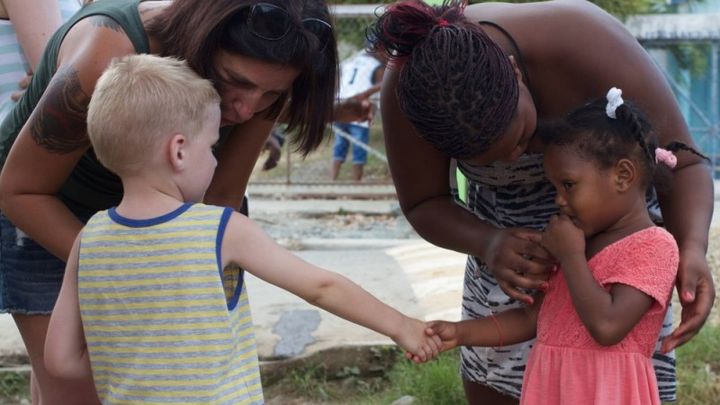
Help today & contribute to tomorrow
Donation protected
We've spent the entire month of June in the Dominican. It's been beautiful, and fun but also very sobering. After encountering a hungry and homeless boy, sleeping on a metal bench - on his own despite being 10 or 11 - we began to look into what kinds of organizations were helping kids in his situation down here. Unfortunately, there's not many. The government infrastructure simply isn't there, and the help these people - especially the children - receive is pretty much limited to the help provided by private organizations.
We all know that I have a "anyone can pick themselves up and change their life if they really want to attitude." What you probably don't know, and Sean and I didn't know until a few weeks ago, is that the solution isn't that simple here in the Dominican. Many of the poorest villages here are inhabited by Haitian refugees. And legally, these people simply don't exist.
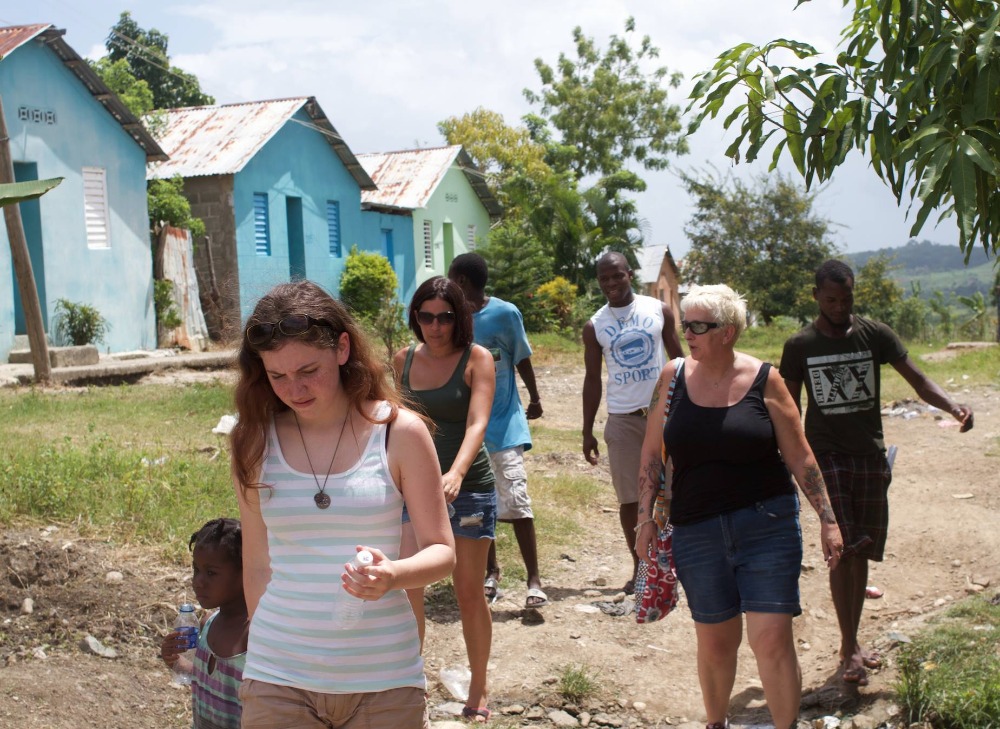 [Some young men of the village walked us around and showed us their village.]
[Some young men of the village walked us around and showed us their village.]
They have no birth certificates, no Dominican equivalant of a social security number, and no legal status here. Some don't know their birthdays or even how old they are. Many were even born here - yet don't exist in the eyes of the Dominican government because they were born to parents without papers.
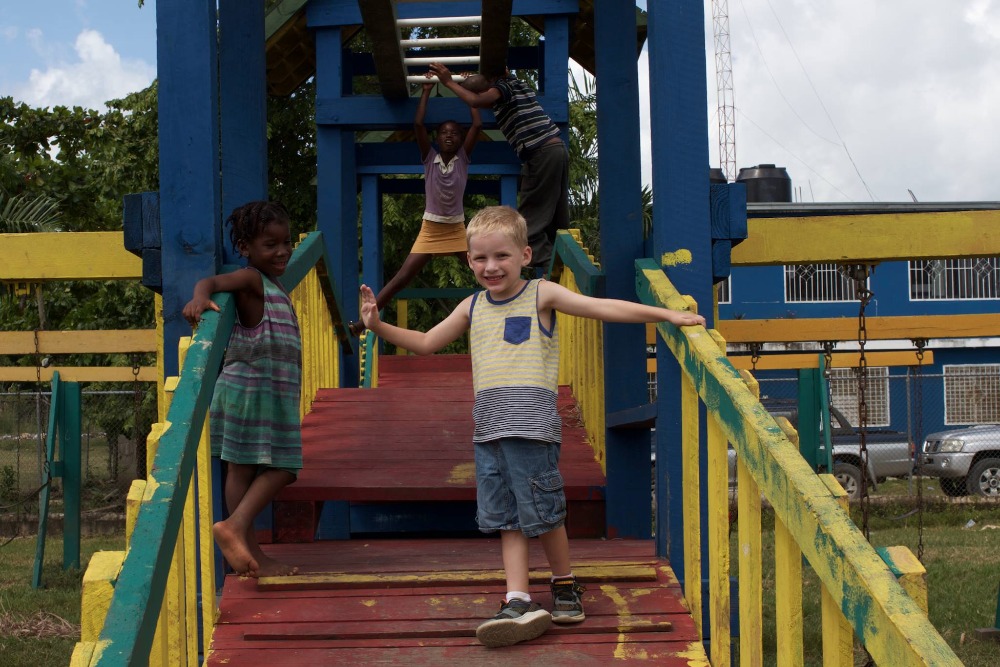 [A group of kids welcomed my son onto the play structure one of the organizations put up in the village. He, of course, readily accepted.]
[A group of kids welcomed my son onto the play structure one of the organizations put up in the village. He, of course, readily accepted.]
There have been a few amnesty periods here, and the humanitarian organizations rush to file paperwork for as many people as they can before the window closes. Some get picked up by the Policia and are dropped across the border in Haiti (and we're told even the poorest villages here are above what awaits most of these people in Haiti). We've heard stories of parents out and about being rounded up in a pickup truck, dropped off across the Haitian border, while their kids are left alone in the Dominican, suddenly on their own, without any idea of what the hell happened to their parents.
Many live in villages without running water. Rubbermaid containers act as toilets. If you're lucky enough, you'll have a house - a 200 square foot cinderblock square, with a tin roof, and no walls or floors that houses about 6 to 12+ people with a number printed on the outside.
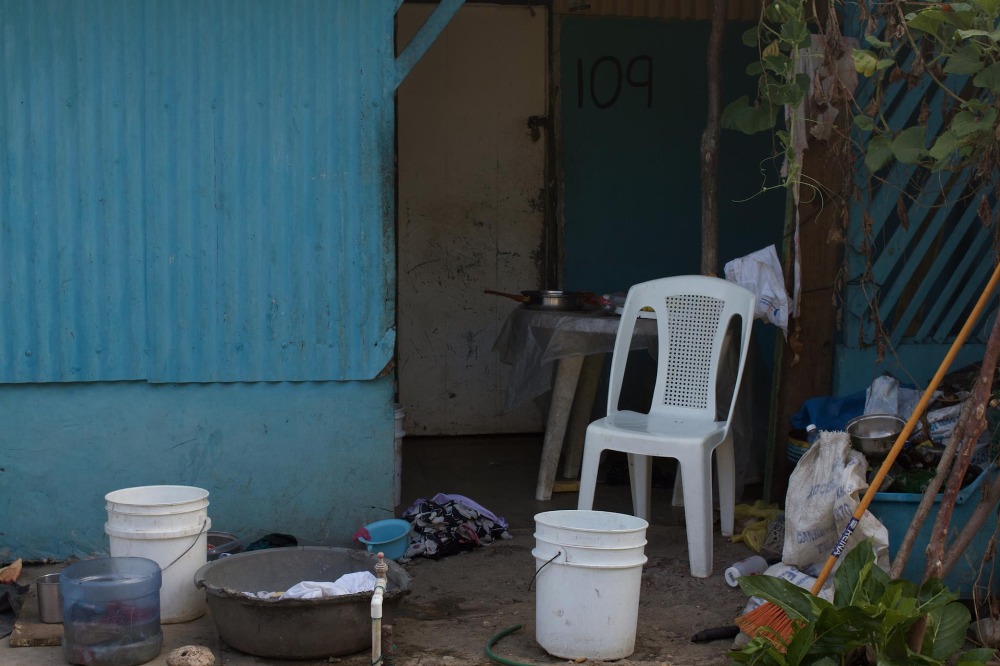 ["Home" #109 of about 250+ in a village of about 2000+ people. That equates to an average of 8 people per home.]
["Home" #109 of about 250+ in a village of about 2000+ people. That equates to an average of 8 people per home.]
If you're luckier, you'll have a bed or two. Some of these children have never even seen their own faces because there are no mirrors in some of the villages. Several residents welcomed us into their homes. I left them with a level of perspective I didn't even know was possible.
Most of the residents cannot read or write, and schooling is a luxury. The "career choice" many mothers are left with to even feed their family is prostitution in the neighboring tourist areas. There are tween girls out on the streets to help support their families. I am not repeating hearsay on that last one. We saw it first hand.
Despite that, what struck me the most is that these people make the best of what they have. We saw a half-clothed toddler dragging an old, busted Coca Cola crate around with a pair of jeans tied onto it - happy as he could be with his "toy." One villager proudly showed us his weight bench and dumbells that he managed to - extremely creatively - make with cement. They still smile, they still love, they still live. Despite living in deplorable conditions, they forge on and make the best of what they have.
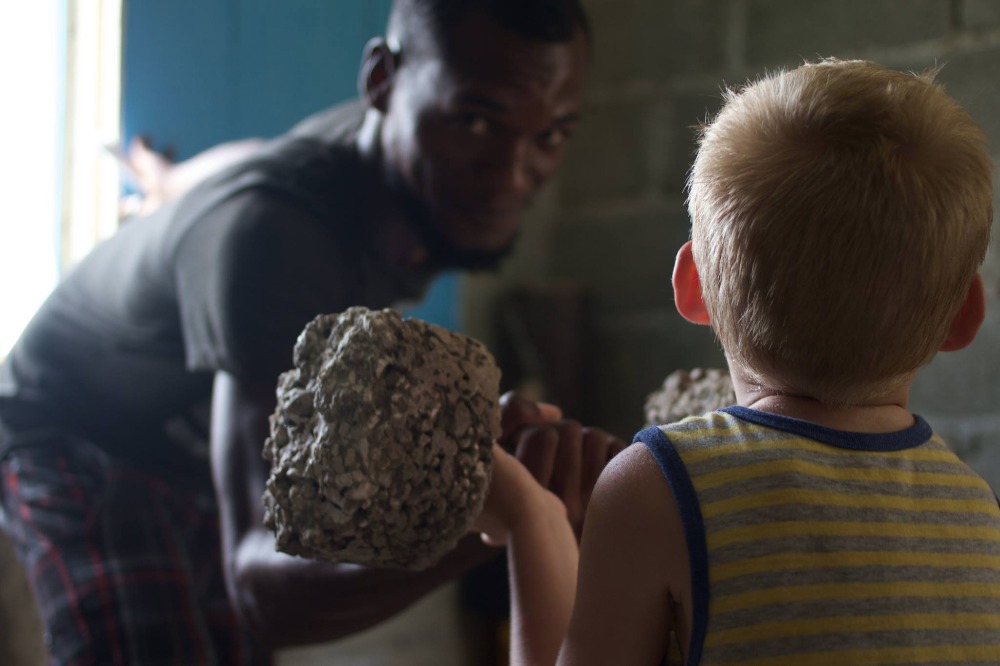 [One of the village residents - Woody - showing my son the aforementioned homemade dumbells. T wanted to lift them, so Woody spotted him.]
[One of the village residents - Woody - showing my son the aforementioned homemade dumbells. T wanted to lift them, so Woody spotted him.]
We were lucky enough to meet in person with two seperate organizations who are helping the kids out here. To be clear, both of these organizations are not based in religion. There are no strings attached for their help. They are simply good people doing much needed humanitarian work here.
And we want to help their missions.
While I believe in teaching folks to fish instead of handing them fish, we can't ingore that these kids need food for today by no fault of their own.
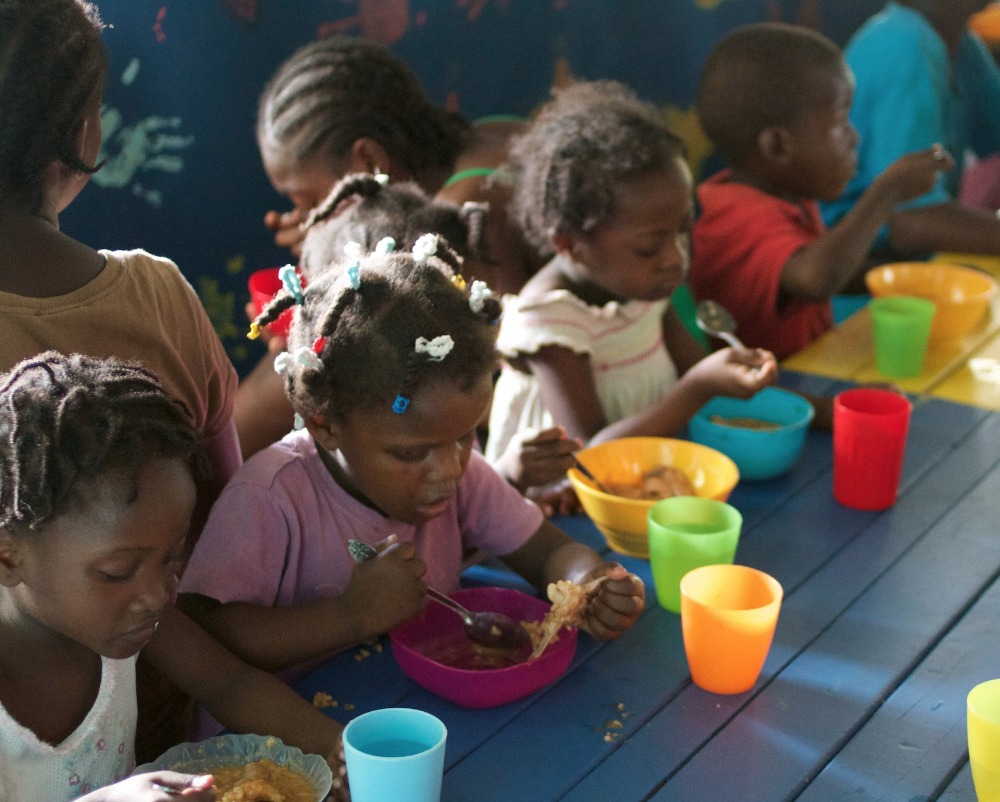 [A group of kids eating one of the three meals Dominican Feed the Kids is able to provide for them each week.]
[A group of kids eating one of the three meals Dominican Feed the Kids is able to provide for them each week.]
One third of the money raised from this fundraiser will go toward providing food to the children of the villages via the Dominican Feed the Kids program.
However, that is a band-aid to a larger problem - which is a lack of education. Without education, they have no hope of finding a better life. They can't even fill out their own amnesty paperwork when amnesty periods open - their only hope of being able to legally exist - because they can't read or write. Therefore, one third of the money raised will go to helping enroll the children of these villages in school where schools are available via a third organization we were made aware of called Speroway - which was recommended to us by our friends at DFTK.
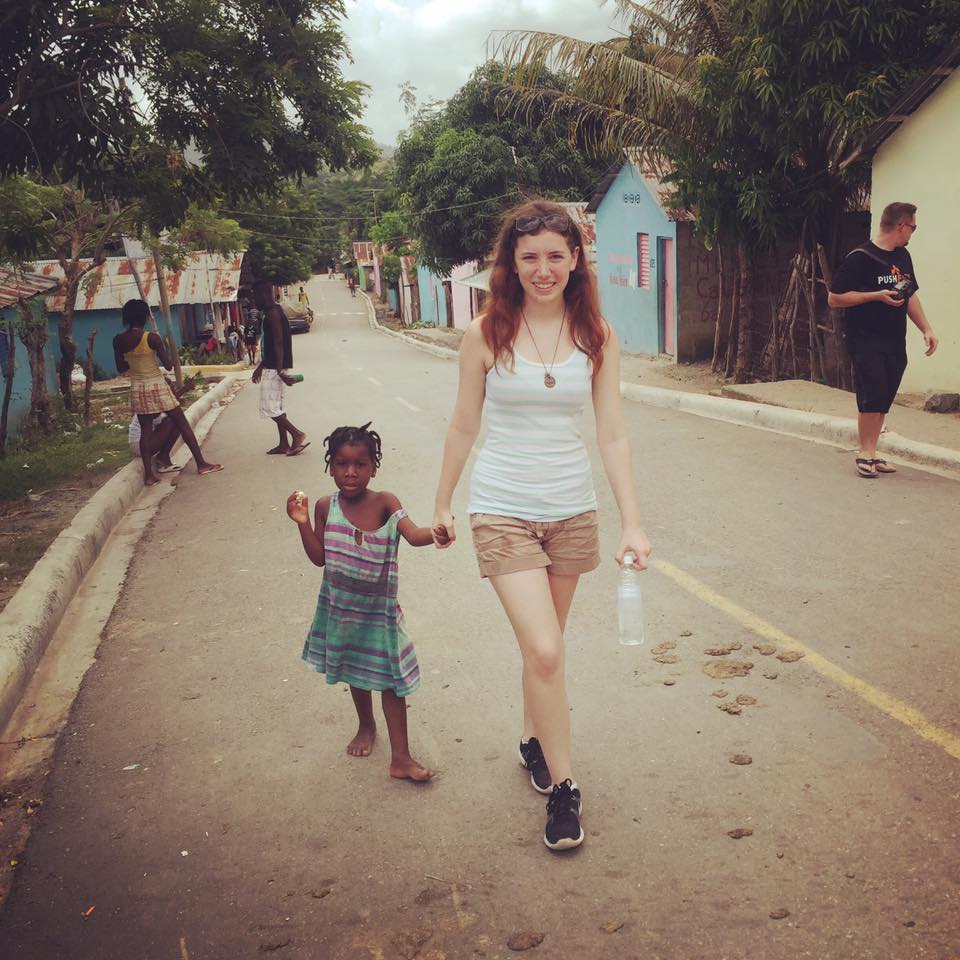 [A young girl in the village walking hand in hand with my 15-year-old daughter - barefoot - for several miles throughout the village. She walked up to my daughter as soon as we got there and they became fast friends.]
[A young girl in the village walking hand in hand with my 15-year-old daughter - barefoot - for several miles throughout the village. She walked up to my daughter as soon as we got there and they became fast friends.]
If we reach our goal, we can donate enough to Speroway to enroll 70 children in school and help 25 young adults get the passport required for them to attend college or obtain their work visa.
But there are still villages where traditional schools don't exist. Or where makeshift schools exist, but can only provide four hours of schooling per day, without textbooks, computers or any of the other items we would consider the minimum standard. Toss in some intermittent electricity and many parents who can't read and write, and "education" in these villages is one hell of an uphill climb.
We met with an organization called Strength for the Journey that is traveling up into the mountain villages to try and bring education to their youth. They are achieving this by using iPads loaded with educational apps to teach the kids. They've told us the results are almost immediate and absolutely mind blowing, despite the fact that these kids have never seen a piece of technology - at all - prior to having the iPad placed into their hands.
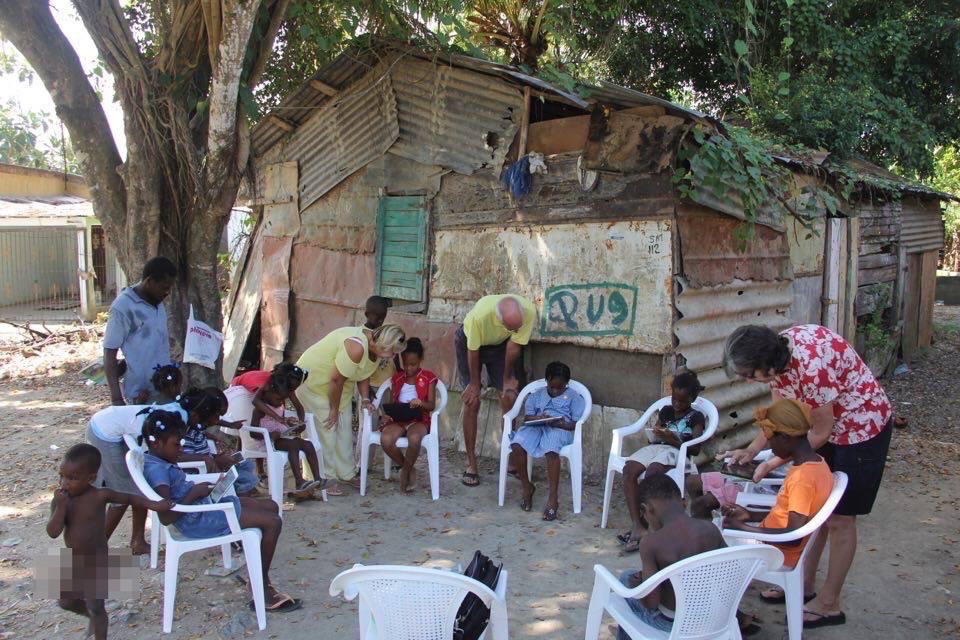 [Children absorbed in learning through the medium of apps.]
[Children absorbed in learning through the medium of apps.]
They are currently working with 18 iPads - many of which are old - which means they can't update the iOS or put certain apps on them due to memory constraints. They have 18 iPads and 150 children on their roster - with more waiting as the group strives to achieve more funding to accomodate them. We would like to double that iPad inventory. If we reach our goal with this fundraiser, we'll be able to do so - and provide them with another 18+ iPads. Understanding and being familiar with technology brings about opportunities that simply are not available to these kids otherwise.
If we go above our goal, the overage will be split between all three of these initiatives.
A final note: The people behind these initiatives are special people. What they see and feel while bringing help and hope to these villages requires a huge amount of strength, resolve and compassion. I spent four hours in their shoes and it took me several days to be able to wrap my heart and head around what I'd seen and how I had no magic wand to "fix it."
This fundraiser has the potential to support MANY children. We can each contribute to giving these kids a much bigger chance to survive - and find a better life for their future.
We all know that I have a "anyone can pick themselves up and change their life if they really want to attitude." What you probably don't know, and Sean and I didn't know until a few weeks ago, is that the solution isn't that simple here in the Dominican. Many of the poorest villages here are inhabited by Haitian refugees. And legally, these people simply don't exist.
 [Some young men of the village walked us around and showed us their village.]
[Some young men of the village walked us around and showed us their village.]They have no birth certificates, no Dominican equivalant of a social security number, and no legal status here. Some don't know their birthdays or even how old they are. Many were even born here - yet don't exist in the eyes of the Dominican government because they were born to parents without papers.
 [A group of kids welcomed my son onto the play structure one of the organizations put up in the village. He, of course, readily accepted.]
[A group of kids welcomed my son onto the play structure one of the organizations put up in the village. He, of course, readily accepted.]There have been a few amnesty periods here, and the humanitarian organizations rush to file paperwork for as many people as they can before the window closes. Some get picked up by the Policia and are dropped across the border in Haiti (and we're told even the poorest villages here are above what awaits most of these people in Haiti). We've heard stories of parents out and about being rounded up in a pickup truck, dropped off across the Haitian border, while their kids are left alone in the Dominican, suddenly on their own, without any idea of what the hell happened to their parents.
Many live in villages without running water. Rubbermaid containers act as toilets. If you're lucky enough, you'll have a house - a 200 square foot cinderblock square, with a tin roof, and no walls or floors that houses about 6 to 12+ people with a number printed on the outside.
 ["Home" #109 of about 250+ in a village of about 2000+ people. That equates to an average of 8 people per home.]
["Home" #109 of about 250+ in a village of about 2000+ people. That equates to an average of 8 people per home.]If you're luckier, you'll have a bed or two. Some of these children have never even seen their own faces because there are no mirrors in some of the villages. Several residents welcomed us into their homes. I left them with a level of perspective I didn't even know was possible.
Most of the residents cannot read or write, and schooling is a luxury. The "career choice" many mothers are left with to even feed their family is prostitution in the neighboring tourist areas. There are tween girls out on the streets to help support their families. I am not repeating hearsay on that last one. We saw it first hand.
Despite that, what struck me the most is that these people make the best of what they have. We saw a half-clothed toddler dragging an old, busted Coca Cola crate around with a pair of jeans tied onto it - happy as he could be with his "toy." One villager proudly showed us his weight bench and dumbells that he managed to - extremely creatively - make with cement. They still smile, they still love, they still live. Despite living in deplorable conditions, they forge on and make the best of what they have.
 [One of the village residents - Woody - showing my son the aforementioned homemade dumbells. T wanted to lift them, so Woody spotted him.]
[One of the village residents - Woody - showing my son the aforementioned homemade dumbells. T wanted to lift them, so Woody spotted him.]We were lucky enough to meet in person with two seperate organizations who are helping the kids out here. To be clear, both of these organizations are not based in religion. There are no strings attached for their help. They are simply good people doing much needed humanitarian work here.
And we want to help their missions.
While I believe in teaching folks to fish instead of handing them fish, we can't ingore that these kids need food for today by no fault of their own.
 [A group of kids eating one of the three meals Dominican Feed the Kids is able to provide for them each week.]
[A group of kids eating one of the three meals Dominican Feed the Kids is able to provide for them each week.] One third of the money raised from this fundraiser will go toward providing food to the children of the villages via the Dominican Feed the Kids program.
However, that is a band-aid to a larger problem - which is a lack of education. Without education, they have no hope of finding a better life. They can't even fill out their own amnesty paperwork when amnesty periods open - their only hope of being able to legally exist - because they can't read or write. Therefore, one third of the money raised will go to helping enroll the children of these villages in school where schools are available via a third organization we were made aware of called Speroway - which was recommended to us by our friends at DFTK.
 [A young girl in the village walking hand in hand with my 15-year-old daughter - barefoot - for several miles throughout the village. She walked up to my daughter as soon as we got there and they became fast friends.]
[A young girl in the village walking hand in hand with my 15-year-old daughter - barefoot - for several miles throughout the village. She walked up to my daughter as soon as we got there and they became fast friends.]If we reach our goal, we can donate enough to Speroway to enroll 70 children in school and help 25 young adults get the passport required for them to attend college or obtain their work visa.
But there are still villages where traditional schools don't exist. Or where makeshift schools exist, but can only provide four hours of schooling per day, without textbooks, computers or any of the other items we would consider the minimum standard. Toss in some intermittent electricity and many parents who can't read and write, and "education" in these villages is one hell of an uphill climb.
We met with an organization called Strength for the Journey that is traveling up into the mountain villages to try and bring education to their youth. They are achieving this by using iPads loaded with educational apps to teach the kids. They've told us the results are almost immediate and absolutely mind blowing, despite the fact that these kids have never seen a piece of technology - at all - prior to having the iPad placed into their hands.
 [Children absorbed in learning through the medium of apps.]
[Children absorbed in learning through the medium of apps.]They are currently working with 18 iPads - many of which are old - which means they can't update the iOS or put certain apps on them due to memory constraints. They have 18 iPads and 150 children on their roster - with more waiting as the group strives to achieve more funding to accomodate them. We would like to double that iPad inventory. If we reach our goal with this fundraiser, we'll be able to do so - and provide them with another 18+ iPads. Understanding and being familiar with technology brings about opportunities that simply are not available to these kids otherwise.
If we go above our goal, the overage will be split between all three of these initiatives.
A final note: The people behind these initiatives are special people. What they see and feel while bringing help and hope to these villages requires a huge amount of strength, resolve and compassion. I spent four hours in their shoes and it took me several days to be able to wrap my heart and head around what I'd seen and how I had no magic wand to "fix it."
This fundraiser has the potential to support MANY children. We can each contribute to giving these kids a much bigger chance to survive - and find a better life for their future.
Organizer
Rae Dolan
Organizer
Katy, TX